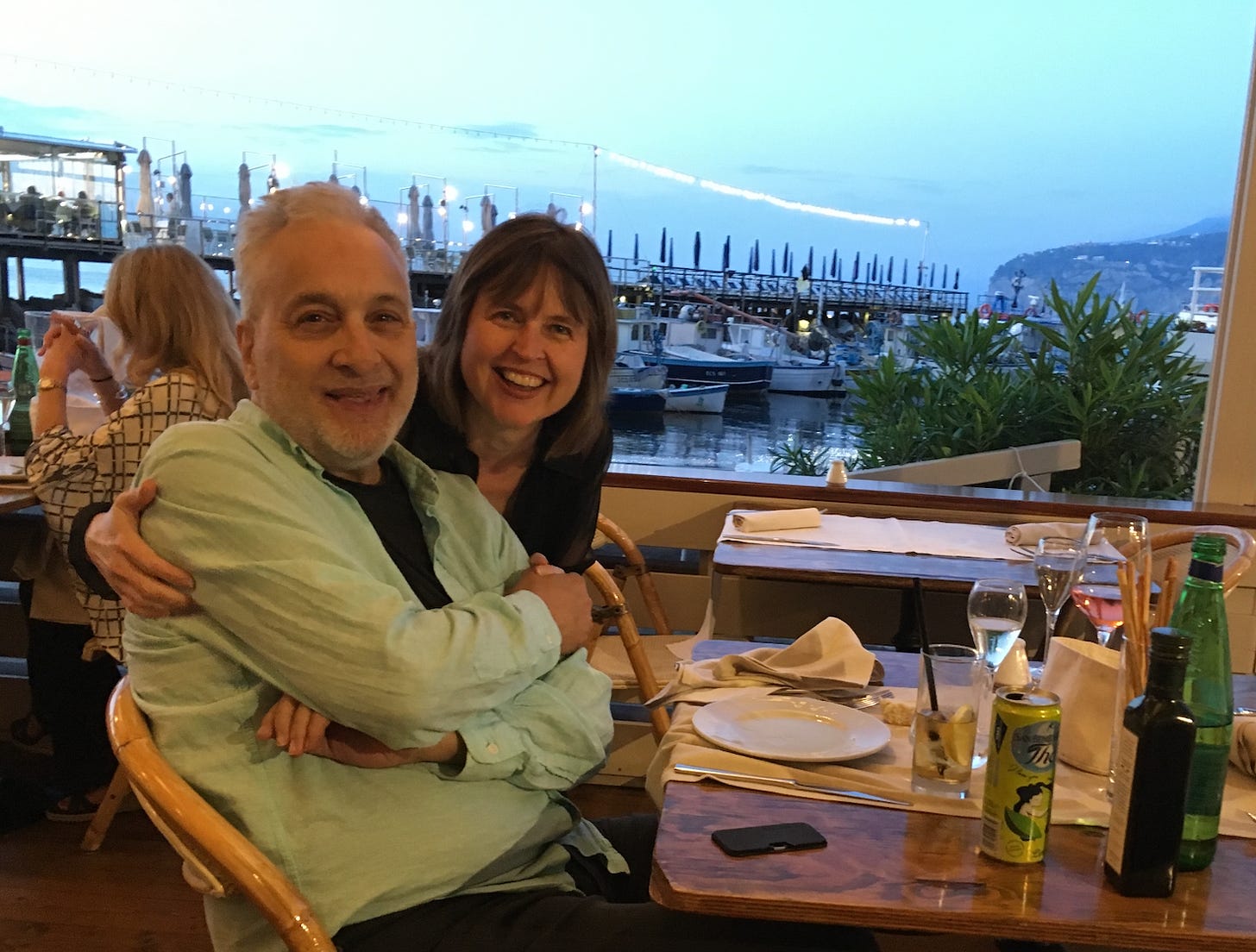“Crying all the time? Lonely? Confused? Upset? Angry? That’s normal. It’s all part of the journey.”
Friends, grief counselors, and books assure me that all my emotions and tears and the deep well of anguish erupting from my belly on the daily is typical, to be expected: it’s part of my journey.
Oh, good! What a relief. This strange, dark cell I’ve been thrust into? I’m just going on a trip, like to Italy or France.
Sandy and me dining al fresco in Sorrento, Italy in 2019
I will see interesting sights, try different foods, have lots of laughs and good times. I feel so much better now. This is something I can look forward to!
Oxford dictionary defines ‘journey’ as “the act of traveling from one place to another.” So, what is my destination? Is there one? How will I know when I get there? And what is my ETA?
Describing whatever place I am in right now as a “journey” belies the truth, the reality that, in fact, I am stuck. Heavy. Immobile. If journey-ing is freedom and movement, grief-ing is containment. Confinement. Jail.
Cambridge dictionary adds that a “journey” is a “set of experiences someone has over time, especially when they change a person in some way,” with helpful examples such as, “Thank you for being part of my journey,” and “We are all involved in this journey called life.” Wow, so, this agony I am in is simply the Journey Called Life. I am on this Journey, I will be Changed, and, eventually, I will come to Greater Understanding. Cool!
Joseph Campbell’s Hero’s Journey describes common structural elements, stages found universally in all stories --- myths, fairy tales, dreams, and movies. The Hero’s Journey was his “metaphor for the deep inner journey of transformation that heroes in every time and place seem to share, a path that leads them through movements of separation, descent, ordeal, and return” (Vogler, The Writer’s Journey). I use this framework of storytelling in my writing. I teach it to my scriptwriting students. Strangely, this is all stuff with which I am, intellectually, familiar.
In the Hero’s Journey, the hero begins in the Ordinary World. Then, there is a Call to Adventure when the hero is rudely disrupted from the comfort of their Ordinary World and presented with a challenge. “The Call throws the Ordinary World off balance” (Vogler). A common example of this Call is a death. Now, the hero is supposed to go off and tackle some high-stakes problem like solving a murder or killing a shark (Jaws) or cracking whips or wrestling snakes or whatever.
Harrison Ford wrestling a snake in Raiders of the Lost Ark
But this Call is scary! The hero doesn’t want to go do this scary thing, so at first they refuse the Call, “preferring the safe haven of the Ordinary World.”
As the hero in my own Journey of Grief, I relate. Sandy’s dying has rudely jolted me from the comfort of my (our) Ordinary World -- a world, in fact, of concrete things and people I can touch and feel and smell. I world I understood and relied upon for its simplicity, its ordinariness -- although I didn’t realize it then. And I DO resist the Call!! I resist -- big-time!! Please, do not go from me, Sandy, do not leave me!, I cried that day, and still do. (That day, his last hours and minutes, I replay a lot in my mind, when I struggled to encourage him to let go because I didn’t want him to let go; what kind of awful journey was that? But I digress.) But I have no say, or the gods do not hear me… Sandy goes on with his dying. And I am thrust onto this stupid Journey, held hostage, forced to engage in a cruel Adventure in which I must be tested, battle, and, the greatest ordeal, confront my deepest fears.
In the storybook version, the hero somehow triumphs over the climactic ordeal which “purifies, redeems, and transforms” them. Not only that, but they return to the Ordinary World with an Elixir -- some magical potion or nugget of wisdom or even just the experience of having survived the Journey. The hero is transformed! Everyone learns! Hearts and flowers.
So… what stage am I in on my Journey? I am still resisting the Call, still at times pleading with Sandy, Come back, I love you, don’t leave! (Is this, too, “normal” for the Grief Journey? Five weeks in, to still be pleading with your beloved to undo what can’t be undone?). Or am I ‘Crossing the Threshold,’ no choice but to leave my Ordinary World for the strange and scary Special World where I’ve got to be tested and battle and face my innermost fears?
“There are people whose death stops time. Deaths that leave the sky murky all day long because even the sun is grieving. Deaths that shut down your muscles and stop the music” (Patricia Amaro). Sandy’s death has stopped time, closed the sun, pushed me into a corner where I am curled up. It has even stopped the music… except, once again, he has a song for this! (How does he DO it???) In Solitary.
And this is it: this is where I am. In solitary. Not on a journey to enlightenment, but in a tiny cell of grief and hurt and fear and pain and disunderstanding (I know that’s not a word, but it feels right). In this place, I am alone, utterly alone:
no links in my chain
no sense in my brain
no plug in this drain
I’m in solitary
no sun through the wall
no pride - just the fall
this cell cannot call
I’m in solitary
When Sandy wrote this, he was feeling alone and misunderstood by all -- including and especially me, I am sure. I now recognize that isolation. Grieving Sandy has jolted me into a strange and lonesome world. Yet, I am also somehow closer to him, feeling now what he felt then… but unable to share it with him. This is my deep sadness, my solitary-ness.
Image by Feldore McHugh
Don’t get me wrong. I deeply feel supported by the kindness and words and love and hugs from those who care and want to erase this pain. It’s just that… that’s impossible. I’m in solitary.
Boy, what a “journey.” I’d rather go to Italy!










Thanks so much for sharing this, Liv It is helping me understand my journey a little better. Love done right is pain, I would do it all again.
You are such a wonderful writer, Liv. Doing Sandy proud. You are…a gem.